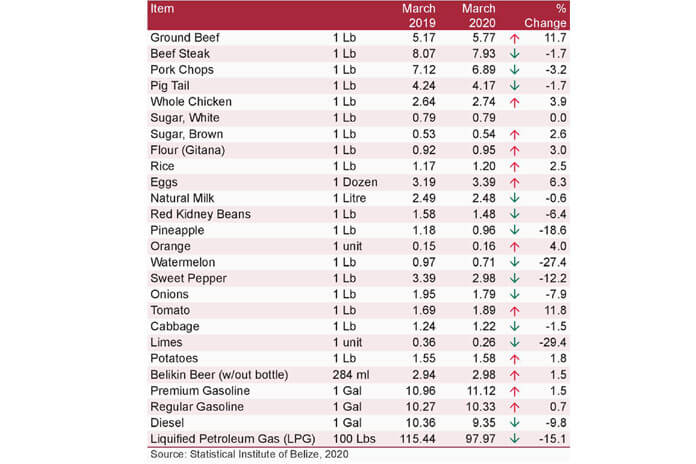BELIZE CITY, Mon. May 3, 2020– The Statistical Institute of Belize (SIB) reported that in the first quarter of 2020, January to March, Belize earned $62.5 million from exports of merchandize, down 31.7% from exports in the same period last year. The report says that changes in the shipping schedules contributed to declines in exports of sugar and petroleum, the commodities that showed the greatest losses. The value of sugar exports fell from $24.2 million to $3.2 million, down $21 million, and we earned nil dollars from petroleum, compared to $6 million in 2019.
On the positive side, earnings from red kidney beans exports increased significantly, up $5.5 million over the $1.5 million the commodity earned in the first quarter of 2019, and export earnings from bananas went up by $1.5 million, from approximately $20 million in 2019 to $21.5 million in 2020. Increased sales of lobster tails pushed exports from marine exports from $10.3 million in the first quarter of 2019 to $10.9 million in the first quarter of 2020.
Despite COVID-19, domestic exports up (2.6%) in March 2020
The SIB report for March 2020 says that increased earnings from red kidney beans and bananas more than offset reduced earnings from other exports, especially citrus, and resulted in a 2.6% ($0.7 million) increase in March 2020 earnings ($26.7 million) over March 2019 ($26 million). Earnings from red kidney beans were up $4 million, and the value of banana exports were up $1.9 million.
Citrus exports earned 40% less in March 2020 ($4 million) than in 2019 ($6.7 million); the value of exports of marine products fell by $0.4 million, mainly due to decreased earnings from conch and lobster, and sugar revenue for March was down by $0.4 million.
Mar-Jan 2020 imports up 6.7% over same period in 2019
The SIB reports that Belize imported $485.3 million worth of goods in the first quarter of 2020, $30.3 million (6.7%) more than we did in the same period in 2019.
The SIB says imports of ‘Machinery and Transport Equipment’ were up $13 million, “from $93.9 million in 2019 to $107.1 million in 2020, due mostly to high-value purchases such as water pumps, aviation equipment and diesel vehicles”; imports in the ‘Beverages and Tobacco’ category went up by “$4.2 million, from $8.5 million in 2019 to $12.7 million in 2020”; more purchases of metal tanks helped push the value of imports in the ‘Manufactured Goods’ category “from a little over $65 million to $68.1 million”; imports of lard (shortening) helped push the ‘Food and Live Animals’ category up by over $2 million, and “a spike in imports of cooking oils saw the ‘Oils and Fats’ category grow by over $2 million”; more purchases of handbags and cigarettes pushed [up] the value of imports in the ‘Commercial Free Zones’ category by just under $2 million dollars, “from $75.6 million in the first three months of 2019 to $77.6 million during the first three months of 2020.”
The value of imports to the ‘Mineral Fuels and Lubricants’ category was up, from $67 million to $68.5 million; the ‘Other Manufactures’ category, with more imports of light and lighting fixtures, and gold jewelry, “went up by $1.4 million, from $32.4 million in 2019 to $33.8 million in 2020”; and the ‘Designated Processing Areas’, with “greater imports of vehicle parts, chemical wood pulp and shrimp feed increased by $1.2 million during the period, from $7.5 million in 2019 to $8.7 million in 2020.”
March 2020 imports up 18.2% over March 2019
The SIB says we imported $174.1 million worth of goods in March 2020, $26.8 million (18.2%) more than the $147.2 million we imported in March 2019.
Imports in the ‘Machinery and Transport Equipment’ were up 30%, “from just under $28 million in March 2019 to $35.7 million in March 2020, owing largely to bigger imports of generators, trailers and excavators”; the ‘Manufactured Goods’ category,” with sizeable purchases of metal tanks during March 2020 (went) from just under $20 million to $25.9 million for the month”; more imports of fertilizers, hand sanitizers, disinfectant sprays, wipes, and laundry detergents led to an increase in the ‘Chemical Products’ category, from $11.2 million to $14.9 million; imports in the ‘Food and Live Animals’ category was up $2.5 million; the ‘Beverages and Tobacco’ category went from $3 million to $5.4 million; the ‘Mineral Fuels and Lubricants’ category “rose by $1.9 million during the month, up from $22.5 million to $24.4 million”; and higher imports of vehicle parts, metal tanks and chemical wood pulp led to a $1.8 million increase in the ‘Designated Processing Areas’ category.
The only category of imports in which there was a decline in spending in March 2020 compared with the same period in 2019 was the ‘Commercial Free Zones’. As a result of “smaller purchases of women’s clothing, sport uniforms and footwear” a reduced amount —$27.2 million— was spent in March 2020, $1.1 million less than in March 2019 ($28.3 million).
SIB reports 0.2% inflation in March 2020 (compared with March 2019)
The SIB reported that for March 2020 “on average, prices for items comprising the basket of selected goods and services commonly purchased by Belizean households were 0.2 percent higher than they were in March 2019.”
The SIB noted that the Consumer Price Index (CPI) survey is “done at the start of the second week of each month,” so “price distortions to goods and services contained within the CPI basket that may have resulted from the COVID-19 pandemic may not be evident until subsequent months.” Also, “price changes occurring in goods and services not normally purchased by households in Belize, but which have seen an increase in demand due to the pandemic, may also not be reflected in the CPI.”
The SIB reported that “higher prices were seen for items such as home rental costs, international airfares and tertiary education fees” but “the effect of these were balanced off by lower prices for several food items, Liquified Petroleum Gas (LPG) and fuel.”

